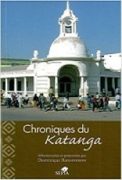The Revenant
Like a prodigal son, Lufuluabo returns. He returns from a long and difficult journey. He will have to get used to the new manners and new names of the avenues and principal squares of the city: Avenue Mobuto [1] is now L. D. Kabila [2] Street; the images of President Mobutu have been replaced by bigger and more numerous ones of President L. D. Kabila; the little market once known as “Soko ya Bazungu” because of the wares that were displayed there has moved, and is now L. D. Kabila Market. The people usually call it “the market of Mzee.” The governor, Kyungu wa Kumwanza, [3] for reasons of his own, has also renamed certain areas and avenues: the road that leads to the working-class district Katuba now bears his name. The Place de L’Étoile has become Place Moïse Tshombe; [4] Avenue Kasai has become Avenue Munongo, [5] and the Katuba Kananga [6] neighborhood has become Katuba Kaponda [7].… So many changes! The contradiction is great. The public places and roads are full of potholes, mud, and pools of filthy water, but this matters less than the worthy names they bear.
He returns, he who left the country as a very young man to study in Grenoble, swearing he would never come back. After a first round of coursework in different fields, he married a Frenchwoman who later on fled with her West African lover, a marabout who was living in France under the protection of one of the big guns in French politics. In hunting them down, he ended up homeless in Paris, a fixture of certain Metro entrances: Barbès–Rochechouart at first, then Réaumur–Sébastopol, and finally La Motte-Picquet–Grenelle.
Like the prodigal son, he returns heavy with memories of the paternal home. In his mind’s eye, he again sees the zoo and the big chimney of the state mining company, Gécamines, puffing bluish breath from its lungs with arrogance and pride, a symbol of the company’s historic ascent and Abel’s offering giving glory to his Creator.
His father had been an executive officer in the company and his older brother—his only brother, an engineer from the Official University of Congo—was one, too, but posted to Kolwezi, that tiny city of pleasure! Nothing but pleasure there, let me assure you!
Luano International Airport is a far cry from Roissy Charles de Gaulle, from where he had caught his plane only a few hours before. An old man, shabbily dressed, greets him with joy:
“Wako! Wako! Wako!”
He translates the Swahili expression mechanically as “yours,” and says in reply, “wako,” as if to affirm “I am one of yours.” He doesn’t understand that the old man refers to his origins to obtain some favor…. How much has changed!
Despite all the marvels he saw in France, the memory of the zoo has never left him. His child’s mind was really marked by that space. The big public buses no longer exist. They have been replaced by vans called “taxi-buses,” inside of which mothers-in-law and sons-in-law shamelessly scramble their legs. A taxi-bus pulls up while he is looking for the stop. The conductor hails him, shouting out his destination:
“Gécamines?”
He takes his seat. He is the last to pile in. A woman looks at him and says, with a smile:
“Wako! Wako! Wako!”
“Wako!” he answers back.
Everyone turns around to stare at him. He doles out an easy smile while nodding his head.
At the zoo’s entrance, the ticket seller is nowhere to be found but the gate is wide open. After a moment of hesitation, he decides to enter. A loudspeaker plays some song or other by Wenge Musica at full blast. Such loud noise, he thinks, must disturb the animals.
He stops himself from admonishing a young man in his twenties who practices dance moves in front of the loudspeaker instead of going to work. He makes his way to the crocodile pond. An old couple of caimans—seemingly starving—warm themselves in the sun, waiting to see which will be the first to die. The reptile cage, which once took his breath away with an upwelling of admiration and fear, is empty. The way to the den of the black bear—that gigantic, impressive hulk—is impassable. He retraces his steps. Almost all of the paths are deserted. The few people he meets say pathetically:
“Wako! Wako! Wako!”
What a surprise!
He decides to visit the former office of his late father to pay his respects. The building looks dilapidated. The parking lot is empty even though it’s ten a.m. He mounts the flight of steps in an athletic burst. In the begrimed waiting room, an old security guard in a faded uniform drowses behind a broken secretary desk. She starts, and says, in a shrill voice:
“Wako! Wako! Wako!”
This time he goes past without answering. From a window on the other side of the room, he notices the unmown grass and straggly flowers. Falling to his knees, he looks out at the dead chimney that no longer emits anything at all, raises his hands toward the sky, and cries out in desperation, “Mother, we have sinned against you; we are no longer worthy to be called your children!”
All footnotes are the author’s.
[1] Mobutu: the second president of the Democratic Republic of Congo, he ruled for thirty-two years as a dictator.
[2] L. D. Kabila: the third president, who led the so-called “War of Liberation.”
[3] Kyungu wa Kumwanza: Katangan leader who initiated the ethnic cleansing of Kasaians in Katanga during the 1990s.
[4] Moïse Tshombe: Katangan leader who led the Katangan secession.
[5] Munongo: former associate of Moïse Tshombe, also known as “Kifwakiyo” or “The Broom.”
[6] Kananga: capital city of Kasai-Occidental province.
[7] Kaponda: traditional chief of the Bemba people from the southern DRC.
Translator’s Note
A combination of Aimé Césaire’s Notebook of a Return to the Native Land and the biblical parable of the prodigal son, Kayembe’s short story narrates the anguished return from diaspora of one of Congo’s native sons. The matter of place—real and remembered—is central to the effect of this story set between metropolitan France and the mining city of Lubumbashi in the southeastern section of the Democratic Republic of Congo. Clocking in at just a tick under 1000 words, Kayembe’s compact narrative succeeds in conveying the despair of a no longer young man returning from France to find his country bereft of the landmarks of his childhood.
When I translated “The Revenant,” I was serving as a pro bono French-language translator and interpreter at the Program for Survivors of Torture at Bellevue Hospital in New York City. Owing to this work, I became increasingly drawn to Francophone African literatures of conflict and migration. Kayembe’s story seized my attention because it is a cri de cœur, a story that refuses the balm of hope. An editor I showed it to observed that it “feels like the beginning of some larger action, which then just cuts short.” Rather than as a lack of completion, I see this “cutting short,” or refusal to develop into narrative fullness, as a mark of the story’s stance toward personal and political futurity. Packed with allusion to the harsh history of Belgian colonialism and decades of postcolonial strife, in its final lines, the story abjures the moral function of the parable it at first appeared to be. The uninstructive affliction of the character returning to his homeland offers neither hindsight nor optimism.
Along with its brevity and parable-like qualities, the story’s tone of bitter understatement and its mobilization of the Swahili word “wako” as a central motif were interesting features for the translator. The footnotes in the story appear in the French edition. Transliteration of African proper nouns has been changed, where necessary, to reflect standard English spelling.


 Christophe Kayembe was born in 1955 in the copper-mining city of Lubumbashi in the Democratic Republic of Congo. He is the author of stories, plays, and a novel, and has won various African literary prizes. “The Revenant,” which was published in the French-language anthology edited by Dominique Ranaivoson,
Christophe Kayembe was born in 1955 in the copper-mining city of Lubumbashi in the Democratic Republic of Congo. He is the author of stories, plays, and a novel, and has won various African literary prizes. “The Revenant,” which was published in the French-language anthology edited by Dominique Ranaivoson, 


